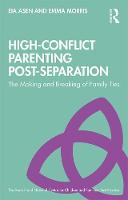The Loss of Sadness: How Psychiatry Transformed Normal Sorrow into Depressive Disorder

Book Details
- Publisher : Oxford University Press
- Published : 2007
- Category :
Clinical Psychology - Catalogue No : 26318
- ISBN 13 : 9780195313048
- ISBN 10 : 0195313046
There are currently no reviews
Be the first to review
Recognising that depression is a devastating illness that affects some people, this book argues that the increased prevalence of major depressive disorder is due not to a genuine rise in mental disease, as many claim, but to the way that normal human sadness has been "pathologised" since 1980. "The Loss of Sadness" argues that the increased prevalence of major depressive disorder is due not to a genuine rise in mental disease, as many claim, but to the way that normal human sadness has been "pathologised" since 1980. In that year, the field of psychiatry published its landmark third edition of The Diagnostic and Statistical Manual of Mental Disorders (DSM-III) which has since become a dominant force behind our current understanding of mental illness overall. As concerns at least major depression, the authors argue that the DSM's definition of the condition is too narrow and that as a result virtually all research on and all clinical approaches to the condition have been based on a flawed understanding about it. The social, political, and scientific implications of this 25-year phenomenon are far-reaching - from the overselling of antidepressants to treat what is ordinary sadness, as Big Pharma exploits the DSM for its own purposes; to intrusive and expensive depression-screening programs at all levels of society, as well-meaning but misguided initiatives translate the DSM into simple terms to catch any whiff of depressive pathology in our midst; to funded reseach into the "epidemic" of depression, which advances the field very litttle and the public even less. Ultimately, the definition of depression that is in operation today has formed the basis for an entire system of social control (e.g. community-wide screening initiatives, intrusive public health policy) that benefits psychiatry, primary care providers, and the pharmaceutical and insurance industries by turning everyone else into a potential consumer of services, needed or not. The authors do recognise that depression is a devastating illness that affects some people. Their chief concern is with the use of this diagnosis as a catchall for anyone who has experienced sadness for more than a few weeks at a time.The result is a pointed yet nuanced critique of modern psychiatry that will stir controversy of the sort that will reacquaint us with sadness as a primary human emotion and that could productively influence the way that depression the actual illness is characterised in the future.
About the Author(s)
Jerome C. Wakefield is university professor, professor of social work, affiliate professor of philosophy, professor of the conceptual foundations of psychiatry in the Department of Psychiatry (2007–2019), associate faculty in the Center for Bioethics in the School of Global Public Health, and honorary faculty in the Psychoanalytic Association of New York Affiliated with NYU Grossman School of Medicine, at New York University.
Customer Reviews
Our customers have not yet reviewed this title. Be the first add your own review for this title.
You may also like
Brothers and Sisters: Developmental, Dynamic, and Technical Aspects of the...
Salman Akhtar
Price £38.00
High-Conflict Parenting Post-Separation: The Making and Breaking of Family Ties
Eia Asen
Price £21.59
save £2.40
The Truth about Trauma and Dissociation: Everything You Didn't Want to Know and...
Valerie Sinason
Price £17.09
save £1.90










